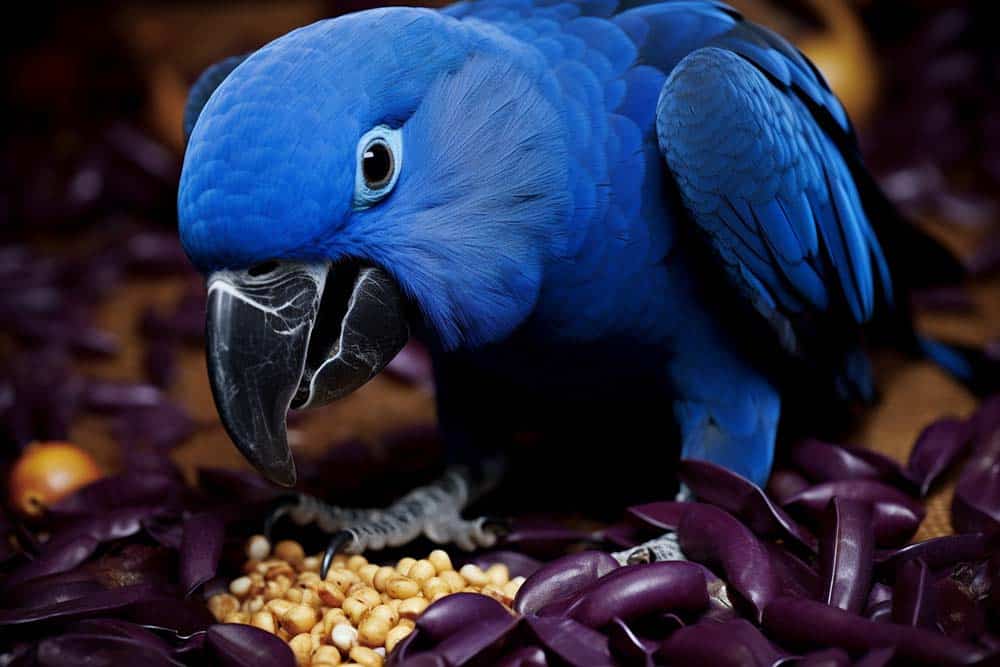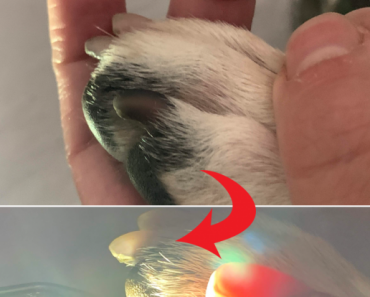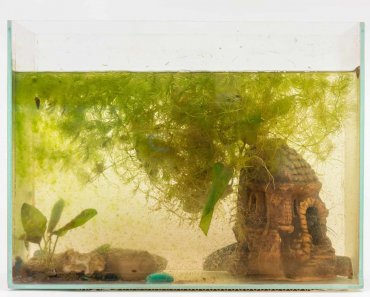
The World of Macaws
Macaws are one of the most popular and beloved parrot species in the world. Known for their striking colors, intelligence, and playful personalities, macaws make excellent pets for those willing to provide them with the proper care.
One key aspect of caring for a macaw is ensuring they have a balanced and nutritious diet. As many macaw owners know, these birds require more than just seeds to thrive.
In fact, a seed-only diet can lead to serious health problems such as nutrient deficiencies and fatty liver disease. Therefore, it’s important to understand what foods should be included in their diet to keep them healthy and happy.
Dietary Needs of Macaws
To maintain optimal health, macaws require a varied diet that consists of fresh fruits, vegetables, nuts, and seeds. In the wild, they feed on a variety of fruits and nuts found in their natural habitat which includes tropical forests across Central America and South America. However, as pets living in captivity, they often rely on their owners to provide them with an adequate supply of healthy foods while keeping an eye out for any potential nutritional deficiencies or excesses that may arise.
The Importance of Variety
Variety is key when it comes to feeding your macaw. Offering different types of food can help prevent boredom with food choices while also ensuring that your bird receives all the vital nutrients needed for good health. Fruits are an essential component in a macaw’s diet as they are rich in vitamins, minerals and antioxidants.
Apples (without seeds), bananas (without peel), and oranges (without rind) are some ideal fruits that can be given to your bird by adding nutrients like vitamin C. Vegetables should also be part of their daily intake; Broccoli stalks—rather than the florets—provide calcium and other minerals essential to bone health, and kale is a great source of vitamins A and K. Carrots, green beans, sweet potatoes, and squash are some other nutritious vegetables to offer.
What Do Macaw Eat?
Fruits: A Rainbow of Delight!
Fruits are an important part of a macaw’s diet since they provide essential vitamins and minerals. Plus, they’re tasty and fun to eat!
Macaws love variety, so it’s important to offer different types of fruits. Some examples include apples, bananas, berries, grapes, mangoes, oranges, and papayas.
All of these fruits are safe for macaws to consume. It’s recommended that fruits make up about 30-40% of a macaw’s diet.
This can be achieved by offering 1-2 servings per day. A serving size should be roughly the size of the bird’s head.
When feeding your macaw fruit, it’s important to wash it thoroughly and remove any seeds or pits that could pose a choking hazard. Some fruits like apples or pears require peeling before serving since their skin is hard for macaws to digest.
Vegetables: The Superfood Sidekick
Vegetables are an essential part of a healthy diet for humans and animals alike. They provide crucial nutrients like fiber and antioxidants that help keep our bodies healthy.
Macaws can benefit from eating vegetables too! Some safe options for macaws include carrots (which are high in beta-carotene), sweet potatoes (which are rich in Vitamin A), broccoli (which is packed with Vitamin C), kale (which is high in calcium), and spinach (which contains iron).
It’s recommended that vegetables make up about 20-25% of a macaw’s daily diet. As with fruits, it’s important to thoroughly wash all produce before serving it to your bird.
To prepare vegetables for your macaw you can chop them into small pieces or shred them into strips depending on the bird’s preference; you can even purée certain veggies if your bird likes that texture. You can also try steaming some vegetables as a way to make them easier for your macaw to digest.
Nuts and Seeds: The Healthy Fats
Nuts and seeds are an important part of a macaw’s diet. They provide essential healthy fats, protein, and other nutrients.
However, nuts and seeds should be fed in moderation since they are high in fat. Some safe options for macaws include almonds, cashews, pistachios, pecans, and walnuts; seed options include sunflower seeds and pumpkin seeds.
When feeding your macaws nuts or seeds it’s important to ensure that they are unsalted and not coated with any flavors or spices that could be harmful since these birds have sensitive stomachs. Nuts should also be stored in an airtight container to keep them safe from pests or mold growth.
To serve nuts or seeds to your macaw you can offer them whole (in the shell) or chopped into small pieces. You can even hide them inside toys as a form of enrichment for your bird!
Now you know the main components of a healthy diet for your pet macaw! Be sure to offer variety within each category- there are plenty of fruits, veggies, and nuts/seeds to choose from- keeping things interesting is key!
Pellets: Pros and Cons of Incorporating Them into a Macaw’s Diet
Pellets have become a popular food option for pet macaws due to their convenience and ease of use. Pellets are made from compressed ingredients such as grains, seeds, fruits, and vegetables.
They are formulated to provide a balanced diet with all the necessary nutrients that macaws need. However, there are pros and cons to incorporating pellets into a macaw’s diet.
One major advantage of pellets is that they offer convenience. Pellets make it easy to ensure that your macaw is getting all the required nutrients in their diet without having to spend time preparing fresh fruits and vegetables every day.
Additionally, pellets have a long shelf life, so you can stock up on them in bulk. Another advantage is that pellet manufacturers strive to provide nutritionally balanced formulas for specific bird species like macaws.
This ensures you don’t overfeed one nutrient or underfeed another because the pellets are designed to meet specific nutritional requirements. However, there are also cons associated with feeding your macaw-only pellets.
One downside is that they lack variety compared to fresh foods like fruits and vegetables which can lead to boredom or weight gain if not properly regulated. Moreover, some experts argue that pelleted diets may lack some important micronutrients present in whole foods such as phytonutrients which help boost the immune system.
Protein Sources: Meat, Eggs, and Insects as Occasional Treats
Protein is an essential nutrient for growth and maintenance in birds such as macaws. Therefore it’s important to include protein-rich sources in their diet occasionally. Meat options such as cooked chicken or fish can be offered once or twice per week in small portions alongside other food options like fruits/vegetables or nuts/seeds.
Eggs can also be given occasionally (once every couple of weeks) as scrambled or boiled eggs. It’s important to remove the outer shell before offering the egg.
Insects such as mealworms, crickets, and waxworms can be offered as occasional treats as well. These provide a great source of protein and can be given to supplement a macaw’s diet.
It’s worth noting that while protein is essential for macaws, too much can lead to health problems such as obesity or organ damage. As such, it’s important to regulate the amount of protein your macaw consumes.
Treats: Safe Options to Offer in Moderation
Treats are an essential part of any pet bird’s diet since they satisfy their natural craving for sweetness. However, some treats can be dangerous for macaws if not given in moderation or if they include hazardous ingredients like chocolate or caffeine. A safe treat option is fresh fruits like apples, bananas, grapes, and oranges.
These are naturally sweet and also provide additional vitamins and minerals in your macaw’s diet. Another safe option is unsalted nuts like almonds and cashews which can be given in small quantities (2-3 per day).
Nuts are high in fat which makes them a good treat option when you want to encourage your macaw to gain weight. It is also important never to give avocados as birds cannot digest them properly due to the presence of persin which is toxic to them.
While treats are an essential part of a pet bird’s life, it’s essential not to overfeed them as this may lead to obesity or other health concerns. With proper regulation and variety on your pet bird’s menu plan, there should be no cause for concern with regard to their overall health.
Water Requirements
When it comes to maintaining a healthy macaw diet, providing fresh water is just as important as serving nutritious foods. Macaws require a significant amount of water each day to stay hydrated and facilitate digestion. In this section, we will discuss the importance of fresh water for your macaw and provide some tips for keeping their drinking source clean.
Importance of Fresh Water for Hydration and Digestion
Water plays an essential role in our lives, and the same is true for our feathered friends. Macaws need plenty of fresh water daily to maintain their bodily functions, including digestion, circulation, and temperature regulation. Without enough water, macaws can become dehydrated or constipated, which can lead to serious health issues.
In addition to drinking water, macaws love taking regular baths that help keep their feathers clean and healthy. Bathing also helps them regulate body temperature during hot weather.
You can provide your macaw with a shallow dish of lukewarm water or use a spray bottle to mist their feathers gently. It’s important to note that not all types of water are equally suitable for your pet bird’s consumption.
Tap water often contains chlorine or fluoride that can be harmful when consumed in high quantities over extended periods. Additionally, certain minerals in hard tap water may lead to kidney problems over time.
Tips for Providing Clean Water
The quality of the drinking source is as essential as its quantity when it comes to maintaining a healthy macaw diet. Remember always to provide fresh, clean drinking water every day while ensuring that the container is free from any contaminants such as soap residues or food particles. Clean your bird’s bowl daily using warm soapy water and rinse thoroughly before refilling with fresh clean tap or filtered bottled springwater if you feel comfortable doing so.
It’s crucial always to keep an eye on the bowl and replace the water as soon as any dirt or debris appears in it. You can also use a water bottle with a sipper tube to provide your macaw with fresh water.
These bottles are designed to keep the water clean and prevent contamination while ensuring your bird has access to fresh water at all times. Be sure to clean the bottle regularly and check that the sipper tube is working properly.
Providing fresh clean drinking water is just as important as serving nutritious foods for maintaining your macaw’s optimal health. Make sure they always have access to enough fresh water daily, keep their container or bottle clean, and monitor their hydration levels for signs of dehydration or other problems that may need medical attention.
Feeding Schedule
Recommended frequency of meals
One of the most important aspects of your macaw’s diet is to ensure that it is fed regularly and on a schedule. This helps maintain healthy digestion, energy levels, and overall well-being.
As a general rule, it’s recommended to feed your macaw two to three meals per day. However, the exact frequency of meals will depend on your individual bird’s needs.
Younger birds may require more frequent feedings, while adult birds may be able to go longer between meals. It’s important to observe your bird’s behavior and appetite to adjust their feeding schedule accordingly.
Timing of meals in relation to activity level
The timing of meals is also an important consideration when it comes to feeding your macaw. In general, it’s best to offer food during the morning and early afternoon when your bird is most active and alert. This allows them ample time to digest their food before settling down for the night.
Avoid feeding your macaw right before bedtime as this can disrupt their sleep patterns and lead to digestive problems. Additionally, be mindful of any changes in routine that may affect their meal times such as daylight savings time or travel across different time zones.
It’s also essential not just what they eat but how much they eat each mealtime. Macaws should be provided with enough food for each meal but not too much that they will overeat or waste food.
The Importance Of Water
Water is just as essential as food when it comes to keeping your macaw healthy. Be sure always to provide fresh clean water at all times throughout the day within easy reach so they can stay hydrated throughout the day. You can use bowls or automatic dispensers depending on which one works better for you and guarantees accessibility for your pet bird at all times
Schedule Example
Here’s an example of a feeding schedule for a macaw: – 7:00 AM: Breakfast – fresh fruits and vegetables, nuts, and pellets
– 12:00 PM: Lunch – fresh fruits and vegetables, nuts – 5:00 PM: Dinner – fresh fruits and vegetables, nuts and seeds
Remember to adjust the frequency and timing of meals based on your individual bird’s needs. With proper feeding habits, you can provide your macaw with the nutrients they need to thrive.
Factors Affecting Diet
Age
Just like humans, macaws have different dietary needs depending on their age. Younger birds require more protein and calcium for growth and development, while older birds may need more vitamin supplements to maintain bone strength. It’s important to consult with a avian veterinarian to ensure that your macaw is receiving the proper nutrients for their particular stage of life.
Health Status
The health status of a macaw can greatly affect their dietary needs. For example, if a bird is suffering from an illness or injury, they may require additional vitamins or minerals to aid in the healing process. On the other hand, if a bird is overweight or has high cholesterol levels, they may need to be put on a low-fat diet to avoid further health complications.
Individual Preferences
Just like humans, every macaw has their individual food preferences. While it’s important to provide them with a balanced diet that meets all their nutritional needs, it’s also crucial to give them some variety in taste and texture so they don’t become bored with their food. Some macaws prefer sweeter fruits like apples and grapes while others are more partial to savory vegetables like broccoli and sweet potatoes.
Seasonal Changes in Food Availability
In the wild, macaws eat what’s available based on the season and location. This means that as seasons change and certain foods become less abundant – or completely unavailable – they must adjust their diets accordingly.
As pet owners, it’s important to be aware of these seasonal changes when planning your macaw’s diet so you can incorporate alternative foods when necessary. For example, during winter months when fresh produce is scarce or expensive due to shipping costs, you might consider switching up your bird’s diet by offering frozen fruits and vegetables instead of fresh ones.
You could also try introducing new types of nuts or seeds as a protein source. It’s important to do research and consult with an avian vet to ensure that any new foods you introduce are safe and healthy for your macaw to consume.
Conclusion: Summary of key points on the macaw diet
Macaws are beautiful and intelligent birds that require a balanced and varied diet to stay healthy and happy. In this article, we have covered the essential components of a macaw’s diet, including fruits, vegetables, nuts/seeds, pellets, protein sources, treats, water requirements, feeding schedule, and factors affecting diet.
Fruits provide valuable vitamins and minerals for macaws. They should be offered in a variety of colors and textures to keep your bird interested.
Vegetables also offer important nutrients like calcium and iron. We recommend offering dark leafy greens like kale or collard greens as well as orange veggies like sweet potatoes or carrots.
Nuts and seeds are high in fat content but should still be included in your macaw’s diet in small quantities. Store them properly to prevent spoilage or contamination with harmful bacteria.
Pellets can provide additional nutritional value but should not be the sole source of food for your bird. Protein sources like meat or eggs can be offered occasionally as a treat but should not make up the majority of your bird’s diet.
Insects can also be offered as a source of protein – just make sure they are safe for your bird to eat. Treats should always be offered in moderation to avoid overfeeding or weight gain.
Safe options include fresh fruit or vegetables that are not part of your bird’s daily meals. Fresh water is essential for hydration and digestion – make sure it is changed regularly to prevent contamination with bacteria or algae.
Factors like age, health status, individual preferences, and seasonal changes in food availability will affect your macaw’s dietary needs – pay attention to any changes in behavior that could signal an issue with their current diet plan. Providing proper nutrition for your macaw is crucial for their overall health and well-being.
A balanced mix of fruits/vegetables/nuts/seeds, water, and protein sources will ensure that your bird is getting all the nutrients they need. Don’t forget to offer treats in moderation and pay attention to any changes in your bird’s eating habits.
Consult with an avian veterinarian to create an appropriate feeding plan and don’t be afraid to experiment with different food options. Your macaw will appreciate the variety!


























